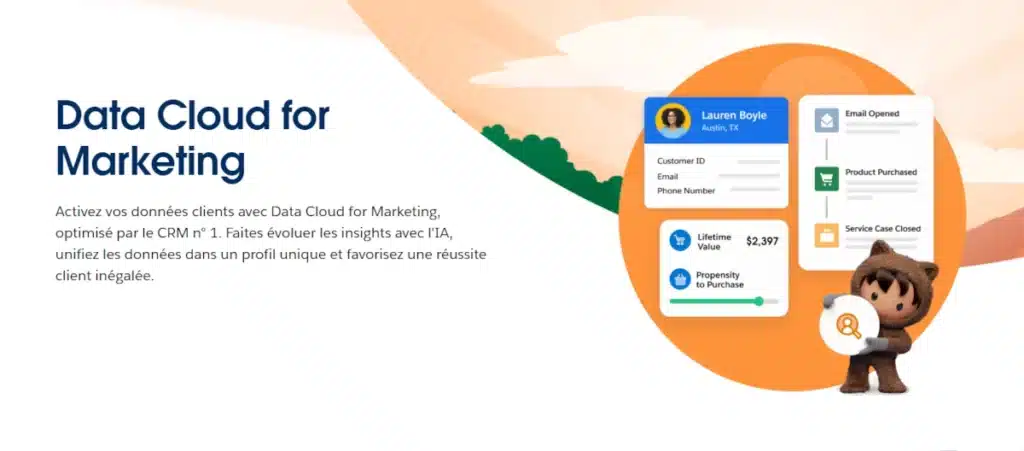Between social media, websites, mobile applications, and CRM tools, the proliferation of digital touchpoints poses significant challenges for marketing teams. Customer data becomes scattered. Fortunately, there is Data Cloud for Marketing. Learn how this solution unifies your customer vision.
The benefits of Data Cloud for your marketing
A 360° view of your customers
Data Cloud for marketing redefines customer data management by creating a unique and centralized interface. This innovative approach transforms how companies analyze their business interactions. Through a unified customer profile, it captures every touchpoint, from social media to webinars, events, and after-sales service. Like a sophisticated radar, this 360-degree vision detects and integrates every signal emitted by the customer into an intuitive interface.
This intelligent platform centered around the customer enriches the user experience at every level. On the marketing side, teams refine their campaigns with an in-depth understanding of the customer journey. On the sales side, salespeople adapt their strategy based on previous interactions.
Collaboration between teams
No more compartmentalization between teams. Salesforce establishes real-time data synchronization between the different departments of the company. A salesperson instantly accesses their prospect’s interactions with technical support, while the marketing team identifies recent exchanges with the sales force. A symbiosis is created between departments, optimizing every customer interaction.
Even more effective communication
With Data Cloud, your customer data transforms into concrete marketing actions. For example:
- The platform automates campaign orchestration by relying on captured customer signals. It activates, suspends, or modifies marketing sequences according to ongoing interactions.
- The customer journeys in Journey Builder dynamically adapt according to observed behaviors.
- Engagement Studio programs adjust their sequences in real time.

By translating each data point into a targeted action, Data Cloud for Marketing promotes tailored communication that resonates with the expectations of each segment.
Ultra-advanced personalization
Thanks to real-time data, Data Cloud powers a contextual intelligence system that adapts each message to the recipient’s specific profile. This precise personalization allows companies to align with the individual expectations of their customers.
The results speak for themselves:
- Acquisition costs fall by half.
- Marketing return on investment jumps by 30%, proving the power of targeted communication.
- Companies generate 40% more revenue compared to their competitors.
Source: McKinsey study
This performance differential illustrates the competitive advantage of personalization based on accurate and up-to-date data. With Data Cloud for Marketing, every touchpoint becomes an opportunity for personalized engagement.
Accelerated reaction time
Data Cloud analyzes each digital interaction in real time. Whether it’s a page view or an email opening, it instantly detects engagement signals and triggers appropriate actions.
This instant reactivity intelligently adapts to the context of each interaction. An automated journey launches the moment a prospect shows interest, while marketing sequences automatically pause if a customer contacts the complaints service. This real-time adaptation avoids inappropriate communications and preserves customer relationship quality.
3 use cases of Data Cloud for Marketing
From advertising campaigns to customer service, through cross-selling, Data Cloud supports all marketing activities. Evidence with 3 concrete application cases.

1 - A top-notch customer experience
Imagine a customer contacting a furniture store’s after-sales service following a defective delivery. At the moment the call arrives, the advisor accesses a complete view of the customer profile.
Real-time data consultation reveals the complete order history. The advisor instantly visualizes the ordered furniture, the transport company, the delivery day, the amount paid, the payment method used, and the history of previous orders. This comprehensive view gives them the means to act quickly and appropriately.
In parallel, Einstein AI Copilot analyzes the unified data to suggest personalized actions. For example, sending a new piece of furniture with a discount voucher for the next order.
On their side, marketing teams automatically adjust to the situation. The satisfaction survey planned after the order is canceled, replaced by a new communication scenario that will be activated once the situation is resolved.
2 - Customer recommendations that hit the mark
Take the example of a customer who regularly navigates an e-commerce fashion brand’s site. Data Cloud for Marketing builds a detailed behavioral profile:
On one side, real-time analysis of the digital journey reveals stylistic affinities. The system detects the most viewed categories, the time spent on each type of clothing, and the items added to the cart. These signals feed a recommendation engine that continuously refines.
On the other side, transactional data enriches customer understanding. Purchase history reveals usual sizes, preferred price ranges, and favorite purchase periods. Data Cloud integrates this information to suggest items matching purchase habits. For example, a customer who regularly buys swimsuits in May will receive suggestions for the new swimwear collection as soon as it launches.
As a bonus, Einstein Copilot enhances these recommendations by incorporating contextual data. Local weather, upcoming events, or current trends refine the relevance of the suggestions.

3 - Optimization of cross-channel advertising campaigns
Final example with a launch campaign for a new 5G plan.
Cross-channel analysis reveals effective customer journeys. Data Cloud tracks interactions between social ads, display, and paid search. The system identifies that users convert more after seeing an Instagram ad followed by a search ad, instead of a sequence of display, then social.
Dynamic segmentation continuously adjusts audiences. When a prospect interacts with a Facebook ad, Data Cloud instantly removes them from similar audiences on other networks. This coordination avoids over-solicitation and optimizes the advertising budget.
Machine learning predicts the best engagement times. By analyzing peak conversion by channel, Data Cloud adjusts the ad distribution. A LinkedIn campaign activates during office hours, while Instagram ads focus on evenings.
Einstein Copilot offers budget optimization suggestions. By detecting high performance of search ads on certain keywords, the system recommends reallocating budget from less performing channels. This continuous adaptation maximizes advertising ROI.
Through these 3 examples, you can already see the full potential of Data Cloud for marketing. But there are many more, such as automating loyalty programs, managing marketing events, personalizing the website…
Do you want to leverage Salesforce to increase your visibility and sales? Train with DataScientest.










